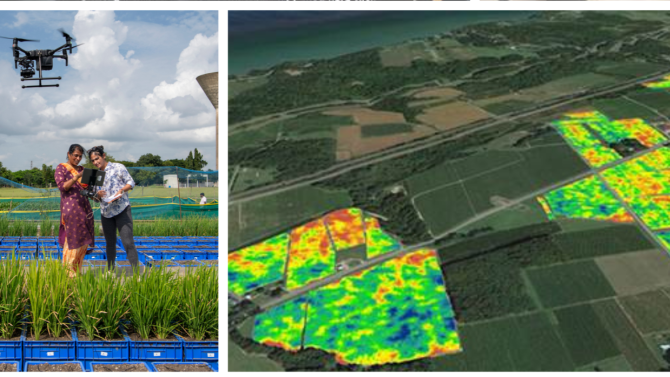The Cornell Institute for Digital Agriculture (CIDA) has announced the recipients of its 2025 Research Innovation Fund (RIF) faculty and student grants supporting new, cross-disciplinary research projects designed to improve global food systems through digital innovation. From AI-based dairy diagnostics to virtual reality for youth in agriculture, this year's awardees are launching bold ideas that promise real-world impact.
"Solving today's agri-food challenges demands more than innovation-it requires collaboration across disciplines, technologies, and communities," said Fengqi You, CIDA codirector and the Roxanne E. and Michael J. Zak Professor in Energy Systems Engineering in Cornell Engineering. "The Research Innovation Fund plays a critical role in this mission by empowering faculty and students to pursue bold, early-stage ideas that can drive meaningful change from the lab to the landscape."
Based at Cornell University, CIDA is a unique partnership that integrates fields such as engineering, computing, life sciences, veterinary medicine, and social sciences to tackle global food challenges with the help of data and digital tools.
"AI has never been more important and learning how to wield and apply AI to digital agriculture is critical," said Hakim Weatherspoon, codirector of CIDA and professor in the Department of Computer Science in the Cornell Ann S. Bowers College of Computing and Information Science. "CIDA is a beacon of light enabling Cornell students and faculty scientists via the CIDA Research Innovation Fund to explore and advance the state of the art, improving the environment and society."
CIDA's RIF provides one-year seed funding for research teams that are exploring brand-new ideas in digital agriculture. The awards help faculty gather early data, build new collaborations, and prepare for larger national or global grants.
Grants are divided into two categories:
- Planning Grants (up to $15,000): For developing big, early ideas into large-scale proposals.
- Seed Grants (up to $30,000): For testing innovative solutions with potential for high impact.
CIDA integrates fundamental discoveries across the agricultural and life sciences, engineering, computing and information sciences, and social sciences to advance equitable, sustainable, and efficient agriculture and food systems.
To qualify, each project must involve at least two faculty members from different Cornell colleges and represent new collaborations not previously funded by CIDA. Awardees will present at the October 21, 2025 CIDA workshop (registration links will be found at the CIDA News + Events page), as well as giving a presentation in the newly launched Cornell course AI for Digital Agriculture.
"Supporting new cross-disciplinary collaborations among researchers in diverse disciplines from different colleges is at the core of CIDA's mission," said Julio Giordano, codirector of CIDA and professor of animal science in the College of Agriculture and Life Sciences (CALS). "These RIF-funded projects exemplify the potential transformative value of innovation across engineering, data science, and agriculture."
2025 CIDA RIF Awarded Projects
Faculty Planning/Seed Grant Projects
Frameworks for Ethical Agricultural Data Aggregation - Sara Emery, Renata Ivanek (College of Veterinary Medicine), Steven Wolf (CALS), Katie Gold (CALS)
Biosensor Tattoos for Livestock Health -Taika von Königslöw (CVM), Cindy Hsin-Liu Kao (College of Human Ecology), Jennifer Sun (Ann S. Bowers College of Computing and Information Science)
Using VR to Increase Youth & Minority Participation in Agriculture - Tapan Parikh (Cornell Tech), Jenny Kao-Kniffin (CALS)
Maintaining Agricultural Machinery - Thijs Roumen (CIS), Francois Guimbretiere (CIS), Terry Bates (CALS), Elizabeth Bihn (CALS)
Visualizing Water Movement in Root Zones - Taryn Bauerle (CALS), Amit Lal (College of Engineering)
Reducing Methane and Arsenic in NY Rice Paddies - Matthew Reid (COE), Jenny Kao-Kniffin (CALS), Chuan Liao (CALS)
CIDA's RIF also funds Student Summer Research Awards (up to $11,310) for innovative research projects in digital agriculture under the mentorship of two faculty members from different Cornell colleges.
"The beauty of the CIDA Student RIF Program lies in the rich diversity of student backgrounds and the wide range of challenges being addressed-where innovations in AI, data science, agriculture, biology, and health converge to advance sustainable food production, from dairy calf diagnostics to grapevine genomics," said Renata Ivanek, codirector of CIDA and professor of population medicine and diagnostic sciences in the College of Veterinary Medicine.
Student Awards
Automated Pose Estimation in Surplus Dairy Calves - Ryan Ye (CALS Undergraduate), Jennifer Sun (CIS), Francisco Leal-Yepes (CVM)
Smart Ultrasound for Diagnosing Calf Respiratory Illnesses - Marina Madureira Ferreira (CALS Graduate Student), Francisco Leal-Yepes (CVM), Jennifer Sun (CIS)
Modeling H5N1 Transmission in Dairy Cattle - Zijun He (CVM Graduate Student), Renata Ivanek (CVM), Jennifer Sun (CIS)
AI Strategies for Sustainable Greenhouse Farming - Jinsung Kim (COE Graduate Student), Fengqi You (COE), Yu Jiang (CALS)
Standardizing Dairy Farm Treatment Records with LLMs - Xinyu Yang (CIS Graduate Student), Jennifer Sun (CIS), Renata Ivanek (CVM)
SplatOverflow: Machine Training Aid - Amritansh Kwatra (CIS Graduate Student), Thijs Roumen (CIS), Elizabeth Bihn (CALS)
LLM Agent for Grapevine Disease Resistance Research - Daoyuan Jin (COE Graduate Student), Yu Jiang (CALS), Jennifer Sun (CIS)
Validating GrapeSAM Vision Model for Wine Grapes - Angela Paul (CALS Graduate Student), Justine Vanden Hueuvel (CALS), Jonathan Jaramillo (COE)
Sorghum Trait Prediction Using NIR Spectroscopy - Marjorie Hanneman (CALS Graduate Student), Mike Gore (CALS), Abe Davis (CIS)







